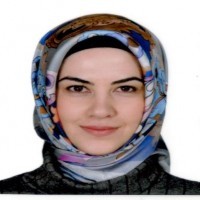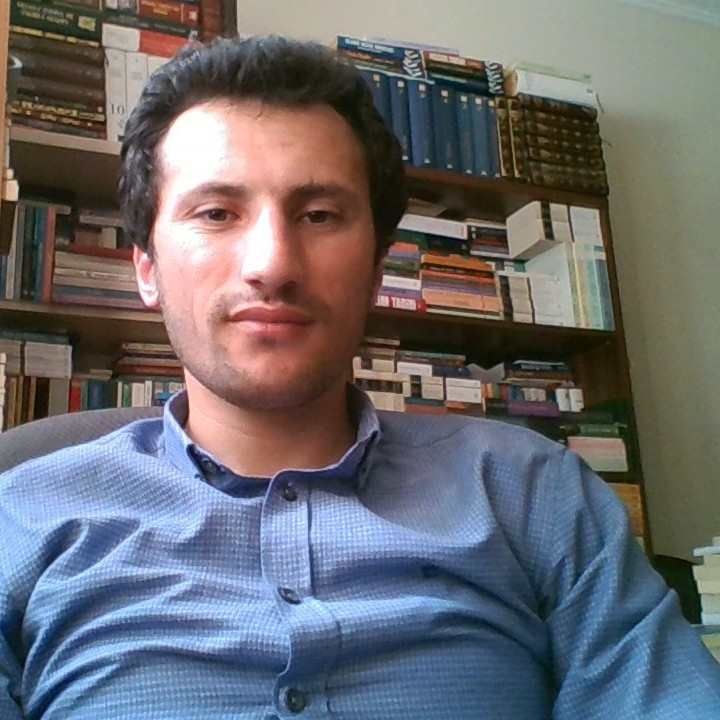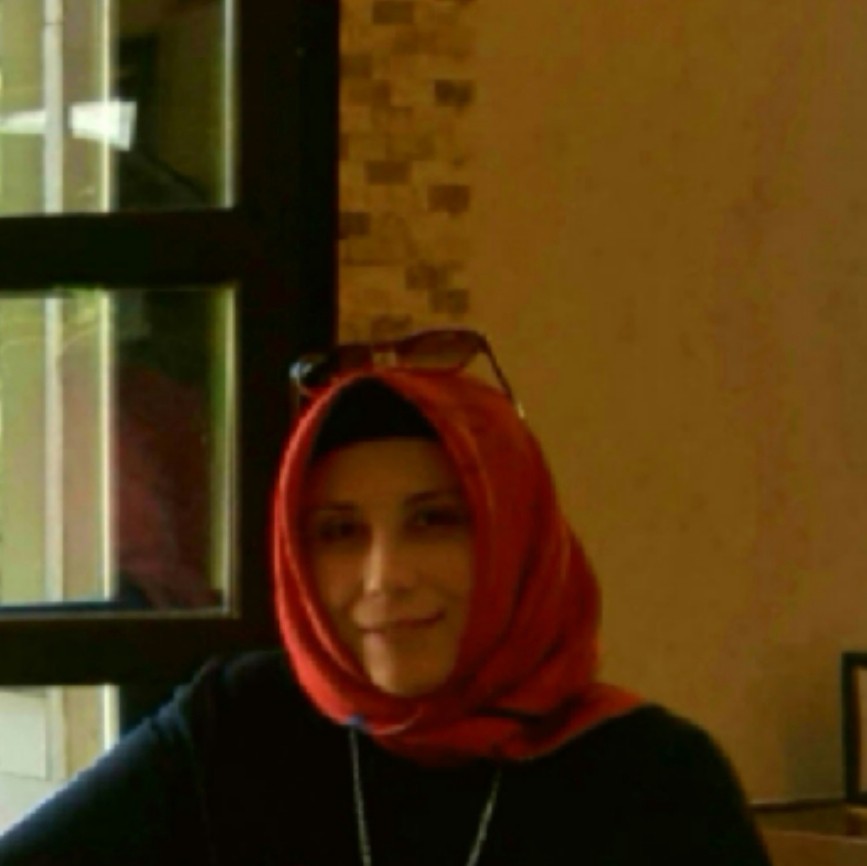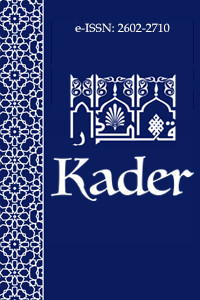Articles
Translations
Book Reviews
Summaries of Doctoral Dissertations
INTERVIEWS
CORRECTION
Issue Editorial Board








 0000-0003-4856-5820
0000-0003-4856-5820



 0000-0001-5620-967X
0000-0001-5620-967X


 0000-0003-1444-7607
0000-0003-1444-7607


 0000-0001-8556-0661
0000-0001-8556-0661





Aim & Scope
Kader (e-ISSN 2602-2710)
Kader started publishing in 2003 in the name of KADER Kelam Araştırmaları Dergisi (e-ISSN: 1309-2030). The name of our journal has been changed to Kader (e-ISSN 2602-2710) on 24/10/2017.
KADER is an international academic journal published two times (June and December) a year. The papers due to be published are carried out on the principle of double blind review. The papers are verified by plagiarism detection program that they do not contain any plagiarism and that they are not previously published.
The journal provides to publish high quality research papers, and besides them, translated papers, research notes, book and dissertation reviews, evaluations of academic activities such as symposiums, congresses and workshops and works such as edition critiques and text simplifications in Kalâm (Islamic Theology) and interdisciplinary fields related to Kalâm. Each paper to be submitted must contain an abstract comprising the introduction, methodology, findings, discussions and conclusion sections briefly, both in Turkish and English between 350 - 400 words (may not exceed 5000 characters including space).
KADER is indexed in ATLA RDB, DOAJ, EBSCO, SOBİAD and TDV İSAM paper databases.
Previous Name: KADER Kelam Araştırmaları Dergisi ISSN: 1309-2030 (01.01.2003-24.10.2017)
Focus and Scope
- Kader is an international and peer reviewed journal.
- Kader is published twice a year (30 June and 31 December).
- Kader publishes academic works such as research and translated papers, research notes, reviews of scientific events (book, dissertation and symposium), editorial critique and simplifications that produced in the area of theological studies.
- Authors must specify their names and surnames with titles, institutions, ROR id and ORCID id.
- In the same issue, two works of an author is published at most. (Except book, dissertation and symposium reviews.)
- In every paper, abstracts comprising the introduction, methodology, findings, discussions and conclusion sections briefly in Turkish and English (350-400 words, may not exceed 5000 characters including space) and key words (5-7 words) must be specified.
- In the submitted works, writing rules and editorial principles of Kader should be taken into account.
- All texts published in Kader are licensed under CC-BY-NC-ND 4.0 licence. Authors assume the responsibility of their texts and retain copyright and commercial rights without restrictions.
- Texts (and translations with their originals in the source language and the permssion of translate) should be sent to editors via Dergipark System.
- Kader does not charge any fee from the authors. Submission of articles to the journal is free. Publication of accepted articles is also free.
Editorial Process
- The paper submitted for publication may not be previously published or accepted for publication by another publisher.
- Although the journal is published in Turkish, articles in foreign languages are also welcome.
- The editorial board peruses the submitted paper with regard to both form and content before sending it on to referees. After the deliberation of the editorial board, the submitted paper is sent to two specialist referees in order to evaluate it whether has scientific perfection or not. In the case of approving of them, the paper is published. If the article is rejected by one of them, it is sent to a third referee. According to the decision of the third referee, the editorial board makes final decision whether the paper is published or not. The reports of referees are confidential. Authors are informed within the process about the decision regarding the publication of their articles.
- The authors have to take notice of referee’s report. The authors assume the responsibility of the article with regard to the style, content, scholarly value and legal aspects. The editorial board reserves the right to accept or reject the text. Texts submitted to the journal are not returned, even if they are not accepted for publication. The published texts of the authors could be removed from publication in accordance with the decision of the board. They could not be withdrawn from the journal without the decision of the board.
- A paper cannot be withdrawn by its author after the completion of the evaluation process without a reasonable justification within the scope of publication ethics. In case of such a request, the paper is removed from the system by rejection.
- All texts published in Kader are licensed under CC-BY-NC-ND 4.0 licence. Authors retain copyright and commercial rights without restrictions.
Period
Kader is a peer-reviewed academic journal published twice a year.
Open Access Policy
This journal provides immediate open access to its content on the principle that making research free available to the public supports a greater global exchange of knowledge.
Author Guidelines
WHAT WE LOOK FOR IN YOUR ARTICLE?
KADER is a
peer-reviewed Journal published twice a year as June and December.
We consider for publication in jour ournal published articles which:
Report original science, and add significantly to research already publishedare of interest to the community
are scientifically rigorous
have sound motivation and purpose
have not been published previously in the peer-reviewed literature, including in another language
are not under consideration for publication in any other peer-reviewed journal or book available through a library or by purchase.
It is particularly important for authors to consider whether they have enough new results before starting to plan and write a paper for submission to an CUD. Reporting incremental steps forward from previous work is not good enough.
Articles based on theses for higher degrees may be submitted, although authors should take care that such articles are prepared in the format of a research paper, which is more concise than is appropriate for a thesis.
Articles reporting work that was originally presented at a conference may be submitted, provided these articles do not appear in substantially the same form in a peer-reviewed, published conference proceeding. Again, authors should take care to ensure the format of a research paper is used. The article length should also be appropriate to the content. In case of doubt, please enquire with the journal.
All articles are judged solely on their scientific merits. Unbiased consideration is given to all manuscripts offered for publication regardless of whether or not the authors request publication on an open access basis and regardless of the race, gender, religious belief, ethnic origin, citizenship, political philosophy, sexual orientation, age or reputation of the authors.
We treat all submitted articles as confidential until they are published and they will only be shared with those referees, Board members, Editors and CUID staff who are directly involved in the peer review of the article.
How to prepare your article
Before submission please check the individual journal homepage for information on the journal’s subject scope, available article types, specific manuscript length limits and details of any variations to the peer review process that might apply.
General
CUID aims to be flexible and to make submission as easy as possible for authors. We only require a PDF file of the new article (and any suitable supplementary data files) on submission. Authors are asked to submit at revision stage the source files used to create their PDF (to assist with accurate typesetting), the text of which can be in either Microsoft Word or TeX/LaTeX. Our online submission form also allows authors to collect and directly upload their article from the arXiv and to upload other compressed or archived files.
Authors can format their papers in the way that they choose. It is not necessary to try to produce pages that look like published journal pages, as the detailed design (typesetting) work will be undertaken by CUID as part of the production process. However we do ask that authors consider the readability for referees when formatting their manuscripts. For example, please use a reasonable font size (at least 10 point) and line spacing. There is no need for authors to include line numbers in their manuscript as these will automatically be added on submission. Figures and tables should be embedded at the appropriate point within the text, rather than placed at the end of the manuscript. Papers must be written in Turkish or other languages such as English and Arabic.
Length of submissions
Most journals have guidelines for the maximum recommended length for each different type of article, as detailed in the scope statement available from that journal’s homepage. It is important that you check these guidelines when preparing your submission. Articles which are longer than the length limit may still be considered for publication provided that the length is clearly justified by the scientific content.
Article structure
Your article should normally consist of the following sections and should follow the Introduction, Methods, Results and Discussion system:
a title page with the title of the article, name(s) of author(s) and address(es) of establishment(s) where the work was carried out
an abstract
an introduction
a methods section
a results section
a discussion section
a conclusion section
an acknowledgments section
a list of references
The following sections give a brief overview of the main elements of an article. Please read these first. You can find more detail in our LaTeX and Word guidelines which are presented in the style of a typical article, and offer suggestions on how to format a manuscript.
Title page
Title of article
The title should be concise, informative and meaningful to the whole readership of the journal. Please avoid the use of long systemic names and non-standard abbreviations, acronyms or symbols.
Authors and addresses
Author lists should be finalised prior to submission (for more information on this please consult our Ethical Policy for Journals). For articles with several authors, please list the names of all the authors first, followed by the full postal addresses, using superscript numeric identifiers to link an author with an address where necessary.
ORCID
We encourage you (and your co-authors) to register for an ORCID identifier and connect it to your account in our submission and peer-review system. This uniquely identifies you and connects you to your publication. This will help ensure you get credit for your work, improve its discoverability, and help us streamline the publishing process.
ORCID identifiers supplied in this way will be included in published manuscripts, and the publication lists in your ORCID record will then be automatically updated via Crossref. (You will need to grant permission to Crossref the first time; this will be requested via your ORCID inbox.)
Abstract
Your abstract should give readers concise information about the content of your article. It should be informative, accessible and not only indicate the general scope of the article but also state the main results obtained and conclusions drawn. The abstract should be complete in itself - no table numbers, figure numbers, references or equations should be referred to. It should be suitable for direct inclusion in abstracting services and should be between 150-250 words.
Main text
It is helpful for readers if your article is concise, but clarity is essential. Short sentences and paragraphs make reading easier. You should aim for consistency within your article in matters such as hyphenation and spelling.
All acronyms and abbreviations should be clearly explained when they first appear in the text, and all units used should be consistent throughout the article.
Article structure
Introduction: This should be concise and describe the nature of the problem under investigation and its background. It should also set your work in the context of previous research, citing relevant references. Introductions should expand on highly specialised terms and abbreviations used in the article to make it accessible for readers.
Methods: This section should provide sufficient details of the experiment, simulation, statistical test or analysis carried out to generate the results so that the method can be repeated by another researcher.
Results: The results section should detail the main findings and outcomes of your study. You should use tables only to improve conciseness or where the information cannot be given satisfactorily in other ways such as histograms or graphs. Tables should be numbered serially and referred to in the text by number (table 1, etc.). Each table should have an explanatory caption which should be as concise as possible.
Discussion: This should discuss the significance of the results and compare them with previous work using relevant references.
Conclusion: This section should be used to highlight the novelty and significance of the work, and any plans for future relevant work.
Acknowledgments
All authors and co-authors are required to disclose any potential conflict of interest when submitting their article. This information should be included in an acknowledgments section at the end of the manuscript. All sources of financial support for the project must also be disclosed in the acknowledgments section.The name of the funding agency and the grant number should be given, for example: 'This work was partially funded by the National Institutes of Health (NIH) through a National Cancer Institute grant R21CA141833.'
When completing the online submission form, we also ask you to select funders (from the FundRef Registry) and provide grant numbers in order to help you to meet your funder requirements. For more information about FundRef, please see: crossref.org/fundref.
References
It is vitally important that you fully acknowledge all relevant work. You should also consult our Ethical Policy for Journals for general guidance on compiling your reference list.
A reference should give your reader enough information to locate the article concerned and should consist of:
author name(s) and initials
year of publication
title of the journal or book
the volume number
for books: town of publication and the name of the publisher
and finally the article number or page numbers.
Where there are up to ten authors, all authors’ names should be given in the reference list. Where there are more than ten authors, only the first name should appear, followed by et al.
You should take particular care to ensure that the information is correct so that links to referenced articles can be made successfully. Material which is really a footnote to the text should not be included in the reference list, which should contain only references to bibliographic data. Copies of cited publications not yet available publicly should be submitted for the benefit of the referees. Unpublished results and lectures should be cited for exceptional reasons only. Before submitting your article, please ensure you have done a literature search to check for any relevant references you may have missed.
Reference systems
KADER requires writers to use the Isnad Citation Style 2nd Edition: for more detailed information, please follow the link http://www.isnadsistemi.org/en/
Figures
Carefully chosen and well-prepared figures, such as diagrams and photographs, can greatly enhance your article. We encourage you to prepare figures that are clear, easy to read and of the best possible quality. Characters should appear as they would be set in the main body of the article. We will normally use figures as submitted; it is, therefore, your responsibility to ensure that they are legible and technically correct.
How to submit a new article
Please submit all new articles via the 'Submit an article' link on the journal homepage. Please ensure that you enter all the required information about your article and all its authors before uploading your files. You are required to select some keywords for your article. Please note that, if your article is accepted for publication, we will display these keywords on the published article. Authors may propose preferred (and non-preferred) referees on submission. The suggested referees should have suitable subject expertise and not have any conflicts of interest (please see the Peer Review policy for further information on conflict of interest). These suggestions will be considered; however, the editorial staff and/or the Editorial Board will make the final decision regarding referee selection.
If you are a new author, you will need to set up an author account before submitting your first article. Using the Author Centre, you will be able to track the progress of your article, respond to the referee reports, and submit your revised version.
When submitting a new article, we only require you to upload a single PDF file and any relevant supplementary data at this stage. The PDF should contain your complete manuscript, including any embedded figures and tables. You may upload your article from the arXiv directly by entering the arXiv e-print number. Please also submit any permissions that you have already obtained at this stage.
If you experience any problems submitting your article online, please contact the journal team for assistance.
How to prepare your revised article
It is common for our referees to request that authors make revisions to their articles. If you are asked to submit a revised version of your article, in addition to article files, we require a list of changes made and a point-by-point response (even if you disagree) to each referee comment before we consider the revision. We recommend that authors copy each referee comment into a separate document and add a response below each comment (and refer to the manuscript line numbers when referring to changes in the main text) to assist our staff and referees with checking revisions as quickly as possible. If the referee(s) and Editorial Board are not satisfied with the changes to your manuscript, it may still be rejected at this stage. Please make sure that you send your revised article to us and not simply the original version again. By observing these guidelines you will be assisting the referees, who give up their time to review manuscripts.
How to submit a revised article
Please submit all revised submissions via the link in the messages of editorial workflow management system provided by DergiPark (TÜBİTAK ULAKBİM) for Kader you received informing you of the decision and asking you to make the revisions.
When submitting a revised article, we require you to upload the revised PDF file (deleting the original version) and your latest set of source files used to create the revised PDF. In addition, you will need to submit your point-by-point response to the referees.
If you experience any problems submitting your article online, please contact the journal team for assistance.
What we do with articles after acceptance
After acceptance your article will be copy-edited and typeset, using the source files that you have provided, and a proof will be produced.
Proofs
We will contact you by DergiPark system when the PDF proof of your article is ready for you to check.
You should check your proof carefully and return corrections using the web page provided. This is the most efficient way to send them to us. Please supply an annotated PDF file using the strikethrough, replacement text and insert text functions. For other changes, please add a sticky note. Please ensure all changes are visible via the ‘Comments’ list in the annotated PDF so that your corrections are not missed.
Please do not resupply a new source file because it is difficult to identify corrections and some could be missed.
The ultimate responsibility for ensuring the accuracy of the published article rests with you. If proofs reach you during an absence of which we have not been informed, or if the proofs are not returned sufficiently quickly, we may publish the article without your corrections.
When checking your proofs you should take particular care checking mathematics, tables, and references. Only essential corrections should be made. You should provide new files if figures need correction. We recommend that you check the accuracy of your original diagrams very carefully before submission; we cannot accept responsibility for any errors in original diagrams.
Copyright and permissions
All texts published in Kader are licensed under CC-BY-NC-ND 4.0 licence. Authors retain copyright, without restrictions. For more detail please see our Copyright & Author Rights page.
Ethical Principles and Publication Policy
Kader is a journal that has adopted open access policy. Kader does not charge any article submission, processing or printing fee from the authors. For more detailed information, you can visit Open Access Policy and Copyright & Author Rights pages.
Kader applies a double blind refereeing policy. The publication processes of the articles are detailed on the Peer-review Process page.
ETHICS POLICY
Publication Ethics
The publication process at KADER is the basis of the improvement and dissemination of information objectively and respectfully. Therefore, the procedures in this process improve the quality of the studies. Peer-reviewed studies are the ones that support and materialize the scientific method. At this point, it is of utmost importance that all parties included in the publication process (authors, readers and researchers, publisher, reviewers and editors) comply with the standards of ethical considerations. KADER expects all parties to hold the following ethical responsibilities.
The following ethical duties and responsibilities are written in the light of the guide and policies made by Committee on Publication Ethics (COPE).
The publication of an article in a peer-reviewed journal is an essential building block in the development of a coherent and respected network of knowledge. It is a direct reflection of the quality of the work of the authors and the institutions that support them. Peer-reviewed articles support and embody the scientific method. It is therefore important to agree upon standards of expected ethical behavior for all parties involved in the act of publishing: the author, the journal editor, the peer reviewer, and the publisher.
1. Ethical Responsibilities of Authors
The authors who submit their manuscripts to KADER are expected to comply with the following ethical responsibilities:
• There is no charge for the paper submitted to the journal.
• Author(s) must submit original studies to the journal.
• If author(s) utilize or use other studies, they must make the in-text and end-text references accurately and completely.
• People who have not contributed to the study at the intellectual level should not be indicated as author.
• If the manuscripts submitted to be published are subject of conflicting interests or relations, these must be explained.
• During the review process of their manuscripts, author(s) may be asked to supply raw data. In such a case, author(s) should be ready to submit such data and information to the editorial board.
• Author(s) should document that they have the participants' consent and the necessary permissions related with the sharing and research/analysis of the data that are used.
• Author(s) bears the responsibility to inform the editor of the journal or publisher if they happen to notice a mistake in their study which is in early release or publication process and to cooperate with the editors during the correction or withdrawal process.
• Authors cannot submit their studies to multiple journals simultaneously. Each submission can be made only after the previous one is completed. A study published in another journal cannot be submitted to KADER.
• Author responsibilities given in a study (e.g., adding an author, reordering of author names) cannot be changed if the review process has begun.
2. Ethical Responsibilities of Editors
The editors of KADER should hold the following ethical responsibilities that are based on the guides “COPE Code of Conduct and Best Practice Guidelines for Journal Editors” and “COPE Best Practice Guidelines for Journal Editors” published as open Access by Committee on Publication Ethics (COPE).
General duties and responsibilities
Editors are responsible for each study published in KADER. In this respect, the editors have the following roles and responsibilities:
• Making efforts to meet the demand for knowledge from readers and authors,
• Ensuring the continuous development of the journal,
• Managing the procedures aimed to improve the quality of the studies published in the journal,
• Supporting intellectual freedom,
• Ensuring academic integrity,
• Following the procedures without making concessions on intellectual property rights and ethical standards,
• Being transparent and clear in issues that require correction or explanation.
Relationships with Readers
Editors must make decisions taking into consideration the knowledge, skills and expectations of all readers, researchers and practitioners that they need. Editors must also ensure that the published studies should contribute to literature and be original. Moreover, they must take notice of the feedback received from readers, researchers and practitioners and provide explanatory and informative feedback.
Relationships with Authors
Editors have the following duties and responsibilities in their relations with authors:
• Editors must make positive or negative decisions about the studies' importance, originality, validity, clarity in wording and suitability with the journal's aims and objectives.
• Editors must take the studies that are within the scope of publication into pre-review process unless there are serious problems with the study.
• Editors must not ignore positive suggestions made by reviewers unless there are serious problems with the study.
• New editors, unless there are serious issues, must not change the previous editor's decisions about the studies.
• “Blind Review and Review Process” must be published and editors must prevent possible diversions from the defined processes.
• Editors must publish an “Author's Guide” that is comprehensive enough in answering queries by authors. This guide must be updated regularly.
• Authors should be provided with explanatory and informative feedback.
Relationships with Reviewers
Editors have the following duties and responsibilities in their relations with reviewers:
Editors must
• respect that their own papers are evaluated by appropriate independent referees from the editorial board.
• choose reviewers according to the subject of the study.
• provide the information and guidance reviewers may need during the review process.
• observe whether there are conflicting interests between reviewers and authors.
• keep the identities of reviewers confidential in blind review.
• encourage the reviewers to review the manuscript in an unbiased, scientific and objective tone.
• evaluate reviewers regularly based on criteria like performance and timing.
• develop practices and policies that increase the performance of reviewers.
• take necessary steps to update the reviewer pool dynamically.
• prevent unkind and unscientific reviews.
• make effort to ensure the reviewer pool has a wide range.
Relationships with the Editorial Board
Editors must make sure that the members of the editorial board follow the procedures in accordance with the publication policies and guidelines, and must inform the members about the publication policies and developments. The editors must also train new members of the editorial board and provide the information they need.
Moreover, editors must
• ensure that the members of the editorial board review the manuscripts in an unbiased and independent manner.
• select the new members of the editorial board from those who can contribute to the journal and are qualified enough.
• send manuscripts for review based on the subject of expertise of the editorial board members.
• regularly communicate with the editorial board.
• arrange regular meetings with the editorial board for the development of publication policies and the journal.
Relationships with the Journal's Owner and Publisher
The relationship between the editors and publisher is based on the principle of the independency of editors.
Editorial and Blind Review Processes
Editors are obliged to comply with the policies of "Blind Review and Review Process" stated in the journal's publication policies. Therefore, the editors ensure that each manuscript is reviewed in an unbiased, fair and timely manner.
Quality Assurance
Editors must make sure that articles in the journal are published in accordance with the publication policies of the journal and international standards.
Protection of Personal Information
Editors are supposed to protect the personal information related with the subjects or visuals in the studies being reviewed, and to reject the study if there is no documentation of the subjects' consent. Furthermore, editors are supposed to protect the personal information of the authors, reviewers and readers.
Encouraging Ethical Rules and Protection of Human and Animal Rights
Editors are supposed to protect human and animal rights in the studies being reviewed and must reject the experimental studies which do not have ethical and related committee’s approval about the population given in such studies.
Precautions against possible Abuse and Malpractice
Editors are supposed to take precautions against possible abuse and malpractice. They must conduct investigations meticulously and objectively in determining and evaluating complaints about such situations. They must also share the results of the investigation.
Ensuring Academic Integrity
Editors must make sure that the mistakes, inconsistencies or misdirections in studies are corrected quickly.
Protection of Intellectual Property Rights
Editors are responsible for protecting the intellectual property rights of all the articles published in the journal and the rights of the journal and author(s) in cases where these rights are violated. Also, editors must take the necessary precautions in order to prevent the content of all published articles from violating the intellectual property rights of other publications.
Constructiveness and Openness to Discussion
Editors must
• pay attention to the convincing criticism about studies published in the journal and must have a constructive attitude towards such criticism.
• grant the right of reply to the author(s) of the criticized study.
• not ignore or exclude the study that include negative results.
Complaints
Editors must examine the complaints from authors, reviewers or readers and respond to them in an explanatory and enlightening manner.
Political and Economic Apprehensions
Neither the owner of the journal, publisher or any other political or economical factor can influence the independent decision taking of the editors.
Conflicting Interests
Editors, acknowledging that there may be conflicting interests between reviewers and other editors, guarantee that the publication process of the manuscripts will be completed in an independent and unbiased manner.
3. Ethical Responsibilities of Reviewers
The fact that all manuscripts are reviewed through “Blind Review” has a direct influence on the publication quality. This process ensures confidentiality by objective and independent review. The review process at KADER is carried out on the principle of double blind review. Reviewers do not contact the authors directly, and the reviews and comments are conveyed through the journal management system. In this process, the reviewer comments on the evaluation forms and full texts are assigned to the author(s) by the editor. After the blind review process is completed, the accepted papers will be tested in that are subjected to plagiarism detection program, whether they contain plagiarism or not, and they have been previously published or not. In this context, the reviewers doing review work for KADER are supposed to bear the following ethical responsibilities:
• Each paper submitted to the journal is evaluated by two referees at least.
• If one of the two referees rejects a paper while the other accepts it; the paper is sent to third referee or to the editor for making final decision.
Reviewers must
• agree to review only in their subject of expertise.
• review in an unbiased and confidential manner.
• inform the editor of the journal if they think that they encounter conflict of interests and decline to review the manuscript during the review process.
• dispose the manuscripts they have reviewed in accordance with the principle of confidentiality after the review process. Reviewers can use the final versions of the manuscripts they have reviewed only after publication.
• review the manuscript objectively and only in terms of its content and ensure that nationality, gender, religious and political beliefs, and economic apprehension do not influence the review.
• review the manuscript in a constructive and kind tone, avoid making personal comments including hostility, slander and insult.
• review the manuscript they have agreed to review on time and in accordance with the ethical rules stated above.
4. Ethical Responsibilities of Publisher
The Board of KADER is conscious of the fact that they must observe the ethical responsibilities below and act accordingly:
• KADER does not charge any article submission from authors.
• Editors are responsible for all the processes that the manuscripts submitted to KADER will go through. Within this framework, ignoring the economic or political interests, the decision-makers are the editors.
• The publisher undertakes to have an independent editorial decision made.
• However, the journal has left the database open on the internet.
• The publisher bears all the responsibility to take the precautions against scientific abuse, fraud and plagiarism.
5. Plagiarism Detection Policy
All articles that sent to KADER for publication are checked by Turnitin or Ithenticate (or another suitable tool) in order to confirm that those are not published before and avoid plagiarism.
As part of KADER's commitment to the protection of author rights, KADER has an obligation to assist the scientific community in all aspects of publishing ethics, especially in cases of (suspected) duplicate submission or plagiarism.
If plagiarism is suspected in an article during editorial control or peer review, the nature of the problem is examined.
Plagiarism that is believed to have occurred as a result of error and can be easily corrected, such as missing quotation marks where required, despite giving credit to the source, is reported to the author and correction is requested.
If there is a strong opinion that plagiarism is not unintentional, the article is rejected and the author is informed.
When a reader discovers a significant error or inaccuracy in a paper published in KADER have any other complaint about editorial content (plagiarism, duplicate papers, etc.), he/she should make a complaint by e-mail to kaderdergi@gmail.com
We welcome complaints as they provide an opportunity for improvement, and we aim to respond quickly and constructively.
6. Unethical Behavior
Should you encounter any unethical act or content in KADER apart from the ethical responsibilities listed above, please notify the journal by e-mail at kaderdergi@gmail.com.
Price Policy
Kader adopts open access and free scientific publishing as a principle, published online through TUBITAK ULAKBİM's DergiPark system, which allows academic journals published in Turkey to be published electronically.
No fee is charged from the authors for the publication of the article, and the published scientific studies can be accessed free of charge under the CC BY ND NC 4.0 license.

Kader Creative Commons Atıf-Gayriticari-Türetilemez 4.0 Uluslararası Lisansı ile lisanslanmıştır.

